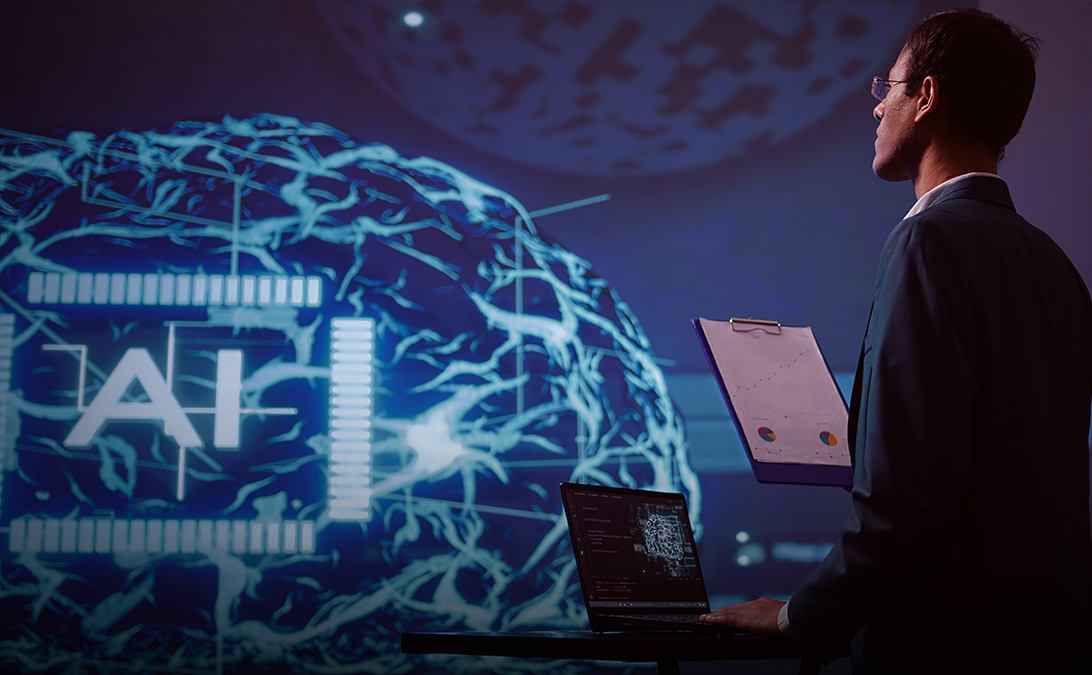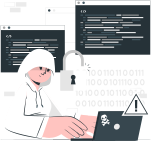
The Role of AI in Software Development: Opportunities & Challenges
The emergence of AI software development solutions has led the technology industry by a storm. AI proves beneficial in several ways and can automate routine tasks, streamline the process, and speed up product delivery. The technology helps to create sophisticated user-centric software solutions at a fast pace.
With AI as part of the strategic development process, companies can free us resources to focus on strategising and creative tasks. Artificial intelligence has the potential to impact every other business industry like wholesale & retail, logistics, manufacturing, and healthcare software development.
Overall, Artificial intelligence (AI) has become an essential tool in software development, with many opportunities and challenges.
What is Gen AI?
Generative AI, or GenAI, is a type of artificial intelligence (AI) that is capable of making new content like text, images, videos, music, and more. It can learn human language, programming languages, art, chemistry, biology, and other complex subjects. It can also perform tasks like answering questions, summarizing, and classifying.
Here are 5 important software development tasks which Gen AI can do
Automating repetitive tasks: GenAI can tackle various software development services based tasks like creating testing cycles, user interfaces, and guides. This reduces the workload of software developers.
Bug detection: AI can help you analyze code more accurately and on a much larger scale than manual code reviews. It can help identify and fix errors in code or suggest fixes.
AI Code generation: Once the developer starts wiring code, GenAI can automatically generate or suggest sections of code. This speeds up the development process.
Documentation: AI-powered Natural Language Processing (NLP) tools allow engineers to create quality documentation with high readability.
Automated testing: AI is helpful with creating test cases and executing testing sequences faster than manually by developers.
Will AI replace software engineers?
With AI evolution focussed towards accuracy and handling complex tasks, many experts argue that it will eventually replace developers. However, it will not happen anytime soon.
While AI can automate repetitive tasks, it cannot fully grasp the context and make innovative decisions required for building robust software applications; human oversight and judgment remain crucial.
AI tools lack critical thinking, creativity, complex problem-solving skills, and adaptability. All of these are necessary to handle the unpredictable aspects of software development.
Key reasons why AI software development tools cannot replace engineers
Lack of creativity and innovation: AI can only generate solutions based on existing data. In contrast, developers can tailor new concepts to tackle problems with innovation.
Contextual understanding: Developers can understand the broader context of a project. This includes researching and analyzing user needs and business requirements on the ground level, which is usually not feasible for artificial intelligence.
Complex problem-solving skills: Software development challenges require critical thinking and adapting to unforeseen situations, which are skills that AI currently lacks.
Ethical considerations and accountability: When issues arise in AI-generated code, it can be difficult to pinpoint responsibility. In contrast, human developers are accountable for their work and this helps to follow a proactive approach for eliminating bugs and errors in the code. So, companies hire dedicated developers to build high-quality applications with the suitable technologies.
Adaptability to change: Developers can go agile and quickly adjust to changing requirements and new technologies. On the other hand the understanding capabilities of AI models are limited by their training data.
How to mitigate the risks of AI in software development?
Artificial intelligence is not free of risks and poses a significant share of threats. Failing to use it in responsible ways can impact the quality of your application and also delay the project. However, implementing best practices can help you eliminate risks from the AI-powered software project.
- Ensure good data quality for training AI models: Use diverse, representative, and unbiased training data to develop AI models. AI systems can use real-time data analysis to foresee possible threats, allowing for timely interventions and strategic risk management.
- Foster transparency: Implement strategies that make AI models more transparent and interpretable. This will help to provide concrete data on how decisions are made.
- Test and validate: Use rigorous testing methods to validate AI models and their performance. Standard testing processes like unit testing, regression testing, and integration testing procedures can be used to determine the efficiency of the AI models.
- Monitor and maintain: Continuously monitor how AI models perform and behave in real-world scenarios. Consider ethics in the AI development process. Regularly auditing AI systems lets you evaluate their performance, fairness, and adherence to ethical standards.
- Prioritize safety: Establish strong safety standards and organizational cultures that prioritize risk management. Only release models, applications, or systems after subjecting them to appropriate security evaluation.
Conclusion
AI can generate boilerplate code, identify potential bugs, and streamline repetitive coding processes. The technology can also suggest relevant code snippets and optimize existing code. Overall, AI is a powerful tool that can significantly enhance developer productivity, but it cannot replace the need for human developers.
At Coding Sprint, an AI software development company, we use technologies in a responsible way. Based on your business requirements, we can help you build promising digital solutions that help you thrive.

